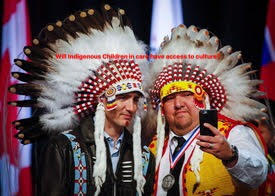Is Colonial canada Still Racist: Challenging The Systemic Racism Of Child Welfare
by mario parent
Can a vulnerable population such as Indigenous families really trust the government is capable of fulfilling its fiduciary responsibility, short answer no.
By Mario Parent, special to, MNM. Posted: APRL 6, 2017 9:00 AM PST Last Updated: APRL 6, 2017 9:30 am PST

photo credit Doug Murray.
*Of first note, in resentment I will not capitalize canada because I refuse to acknowledge illegitimate state power.
Millions of dollars are being withheld from Indigenous child welfare across the nation while apprehension has exceeded the number of children taken into Indian residential school system.
How does this happen? Colonial canada has a two-tiered child welfare system with jurisdictional issues between the province and the federal government. what that means is that Indigenous children on reserves receive less funding from the federal government in contrast to the funding children in the province receive.
After the fiscal budget was announced for 2017 no mention of necessary funding to ameliorate child welfare has been made much to the dismay of child welfare advocates nationally and within the province.
In the midst of a landmark human rights tribunal win in 2016, which ruled that the colonial government is racially discriminating against Indigenous children in the way it funds Indigenous child welfare, many are concerned by the government’s negligence and continued dispute over the funding issues.
Still, multiple court injunctions have been made by the First Nations Child & Family Caring Society to hold the federal government responsible in meeting equitable funding for all children in colonial canada.
what does good PR mean in contrast to human rights violations?

photo credit Jeff McIntosh. Text: Will Indigenous children in care have access to culture?
Reading through the news of the past year has been a collage of selfies by the new leadership of colonial Canada centering Justin Trudeau who took bold platforms to engage Indigenous communities with commitments to reconciliation and a renewed relationship with First Nations. Unfortunately the tone def response to the mismanagement of child welfare has yet to yield action that demonstrates a positive impact for the vulnerable First Nations families that require attention.
It is through the committed efforts of Indigenous leadership that issue of systemic racism in social services such as child welfare is being addressed.

photo credit Chris Wattie/Reuters.
In conversation through the issue of child welfare two community perspectives assert Indigenous sovereignty, accountability, and justice in the face of a national tragedy.
Indigenous Child welfare in the past year has garnered a variety of media attention, leading to headlines like, “Cindy Blackstock: Trudeau Government Failing First Nation Kids On Health Delivery,” and “Wet’suwet’en Nation makes agreement to reclaim child-welfare services.”
For child welfare advocate Cindy Blackstock Indigenous children deserve equal access to government funding that is afforded to all canadians and is adamant about creating social and political awareness to the systemic inequalities that echo the past tragedies of Indian Residential School. Blackstock led a ten year case against the federal government, which resulted in the aforementioned human rights ruling that found the colonial canadian government responsible for systemic discrimination against Indigenous children.
For The Wet’suwet’en Hereditary Chiefs, Moricetown Band and Hagwilget Village Council, together reached a landmark agreement with the Province of British Columbia (BC) to reclaim jurisdiction for child welfare services as a best means to address systemic racism. By taking control over child welfare services the Wet’suwet’en can ensure that children are not removed from the community and have a continued ability to engage with culture, something that is lost when children are put in care outside of the community with non-Indigenous families.
While action to ameliorate the systemic inequality leads a potentially destabilizing threat to the colonial state it is imperative to Indigenous Communities, families, and children to feel safe in the identity which over the last 150 years has been a target of cultural genocide. As Cindy Blackstock has boldly stated “never again!”